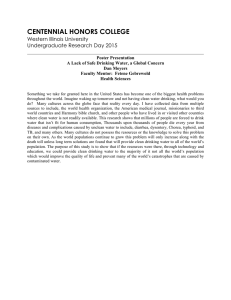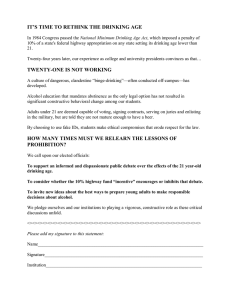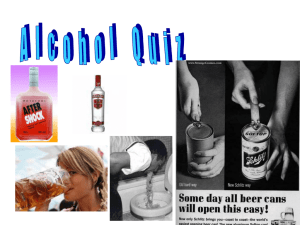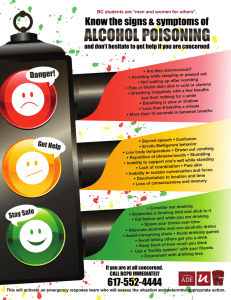SS/A7/8 NATIONAL UNIVERSITY OF IRELAND, GALWAY REVISED ALCOHOL POLICY
advertisement
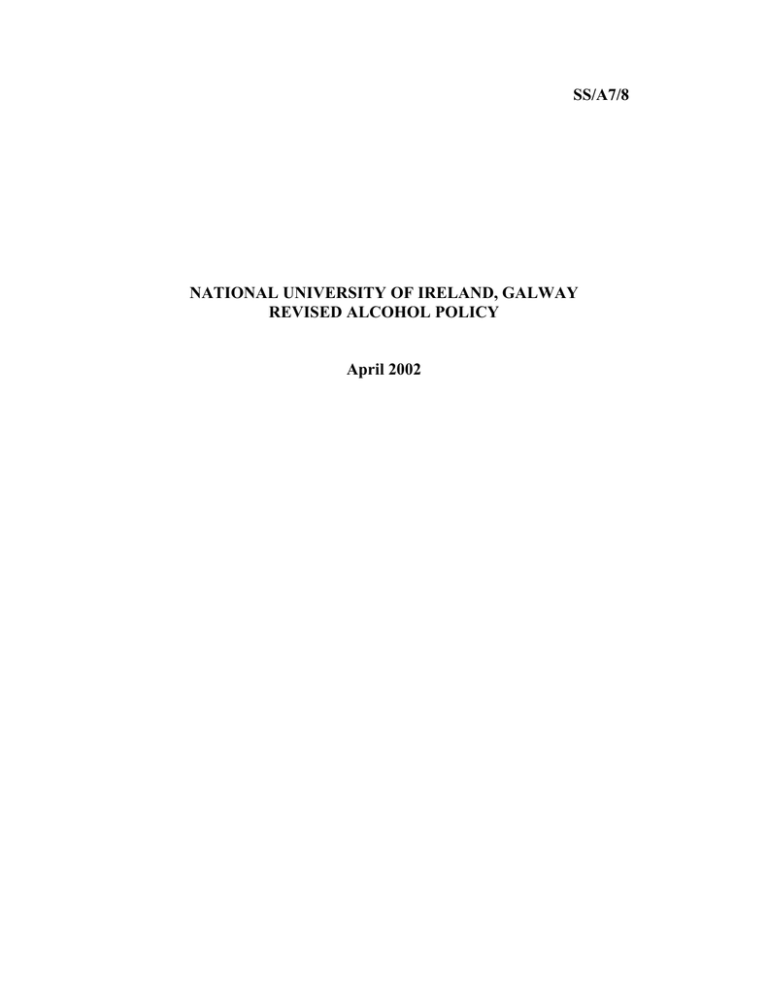
SS/A7/8 NATIONAL UNIVERSITY OF IRELAND, GALWAY REVISED ALCOHOL POLICY April 2002 NATIONAL UNIVERSITY OF IRELAND, GALWAY REVISED ALCOHOL POLICY TABLE OF CONTENTS Background . . . . . . . . . . . . . . . . . . . . . . . . . . . . . . . . . . . 4 1.Rationale . . . . . . . . . . . . . . . . . . . . . . . . . . . . . . . . . . . 1.1 Public health alcohol policy . . . . . . . . . . . .. 1.2 University environment . . . . . . . . . . . . . . . . . . . 1.3 Student life . . . . . . . . . . . . . . . . . . . ... . . . . . 1.4 Aims of University Alcohol Policy . . .. . . . . . 1.5 Review and evaluation……………………… 5 5 5 5 6 7 2.Policy Measures……………………………………….. 2.1 Increasing Awareness and Education . . . . . . . 2.2 Encouraging Alternatives and Choice . . . . . . 2.3 Provide Campus Support Services . . . . . . . . . 2.4 Controlling marketing, promotion and sponsorship . . . . . . . . . . . . . . . . . . . . . . . . .. 2.4.1 Sponsorship……………………………… 2.4.2 Alcohol Promotions……………………… 2.4.3 Advertising Code………………………… 2.5 Limiting harm in the drinking environment. . 7 7 7 8 8 8 8 9 9 3. Local Support Services . . . . . . . . . . . . . . . . . . . . . . . 9 References . . . . . . . . . . . . . . . . . . . . . . . . . . . . . . . . . . . . 10 Appendix A. National Working Group on Alcohol Consumption in Higher Education . . . . . . . 11 Appendix B. Low risk drinking behaviour High risk drinking behaviour . . . . . . . . . 2 12 NATIONAL UNIVERSITY OF IRELAND, GALWAY REVISED ALCOHOL POLICY Members of Student Services Committee Sub-committee appointed to review the existing Alcohol Policy: Mr Matt Doran Mr Jim Byrne Mr Padraig Ó Duinnin Mr Brendan Kennelly The Sub-committee was advised by Ms Cindy Dring, MA (Health Promotion) 3 NATIONAL UNIVERSITY OF IRELAND, GALWAY REVISED ALCOHOL POLICY BACKGROUND The National Alcohol Policy, published in 1996, aims to promote the health of the population by reducing the prevalence of alcohol-related problems. One of the actions called for in the policy was the development of a campus alcohol policy that would promote sensible drinking among students and limit campus-related drinks industry sponsorship. In the last number of years, University and College authorities have expressed concerns on alcohol promotion practices on campus, high-risk drinking among students and the impact of this drinking pattern on student academic achievement, student personal problems and student attrition. An initial response to these concerns was discussed among a small number of third level institutions regarding a code of practice for the promotion of alcohol on University campuses. Further impetus was provided by the Minister of Health and Children, Micheál Martin, at the launch of a three year Alcohol Awareness Campaign when he invited and encouraged all third level institutions to develop guidelines and campus alcohol policies and offered to facilitate the process. In 1998, NUI, Galway adopted an alcohol policy, formulated and recommend by Student Services Committee. The policy aimed to address concerns about the promotion of alcoholic drink on the campus and the damaging effects of excessive consumption by students of the University. This policy resulted in a number of significantly positive changes, including elimination of promotions and advertising of alcohol by Clubs, Societies and the Students’ Union and the provision of alternative social and recreational options. A review of this policy carried out in 2000 pointed out the need for a more comprehensive framework to include environmental strategies, educational strategies, intervention services, and additional enforcement strategies. In October 2001, the Minister for Health and Children launched a "Framework Document for Developing a College Alcohol Policy". Following on this Student Services Committee at its meeting on November 13, 2001 (SS/M5/7) appointed a Sub-committee to review and redraft the University Alcohol Policy in the light of the Framework Document. The policy outlined below is the result of the Sub-committees’ deliberations and is part of a broader, ecological approach to health on campus, The Health Promoting University. This approach, with its origins in the WHO “Health for All” programme, advocates that Universities, as well as fulfilling their educational function, should also adopt the role of encouraging and promoting good health practices for the entire University community. This is achieved by not only addressing specific educational needs of individuals, but also by bringing about changes at institutional, community and policy levels. 4 1. RATIONALE 1.1 Public health alcohol policy The public health or health promotional perspective on alcohol problems, which provides the theoretical rationale for the alcohol policies proposed in this document, is perhaps best understood through comparison with the disease concept of alcoholism. The disease concept, prevalent in the 1950’s and 1960’s, viewed alcoholism as a specific or discrete disease, which was primarily explained in terms of individual vulnerabilities or predispositions, rather than to any negative properties of alcohol per se. Over the last three decades the public health approach, endorsed by the World Health Organisation, has emerged with the weight of evidence-based scientific research. This approach recognises alcohol as contributing to a spectrum of health, behavioural and social problems in terms of its toxicity, its potential to create dependency and its negative impact on human behaviour. It sees consumption levels and drinking patterns as being highly predictive of the incidence and prevalence of problems in any given society or social group. Acute alcohol–related problems, such as accidents, violence, injuries and deaths, are linked to excessive drinking on any one occasion. In many cases these problems occur among light and moderate drinkers who engage in heavy drinking on some occasions. 1.2 University Environment At all Universities and Colleges, diversity of opinion and freedom of choice have long been part of the academic tradition. However, freedom of choice brings with it personal responsibilities which include the obligation to respect the rights of others and to comply with the University rules and regulations. The ethos of the University not only promotes positive learning experiences and academic excellence, but also provides a caring and supportive community where students and staff in need of assistance are given the necessary supports. The University is also obliged to provide a safe working environment for all students and staff. Any activity or practice that constitutes a hazard must be eliminated or minimised to reduce injury or loss. When students engage in high-risk drinking, academic performance, health, personal relationships and safety suffer. However, alcohol issues cannot and should not be tackled in isolation and must be seen within a broader context of lifestyle issues and a supportive University environment. The Health Promoting University structure provides an ideal mechanism to address the alcohol issue. 1.3 Student Life The period of late adolescence and early adult life is a transitional phase for students where new freedoms, new relationships and adapting to a different environment provides daily challenges, in addition to the academic challenges of new courses (Healy et al., 1999). Socialising is an important aspect of University life for students and the University Bar is one of the recognised contexts for meeting friends. However, the cost of socialisation can over-stretch students both financially and academically which can contribute to exam failure and student drop-out (Canavan, 1999; O’Malley & Doran, 2001). First year students are particularly vulnerable and may have poor coping skills for managing the stresses of the new environment. This can lead to a range of negative reactions including an over-reliance on alcohol (O’Malley & Doran, 2001). 5 While exam stress and difficulties adjusting to University are common problems for students, there is also a clustering of problems for a minority of students. This stage of life is also characterised by vulnerability to many mental health problems, all of which may be exacerbated by heavy alcohol consumption. Problems with alcohol can also be linked to problems in other areas, such as problems with relationships, depression, difficulties with exams and financial problems (Canavan, 1999). For these reasons, an effective alcohol policy is an important part of a University’s retention strategy and any scheme of actions to improve the quality of student life. The national lifestyle survey (SLÁN, 1999) shows the vast majority of young adults consume alcohol, half of young people engage in high-risk drinking when they typically drink and about one-third drink over the recommended sensible weekly limit. There is also a higher prevalence of serious injuries among young male adults relating to sport, work, and car / bike. The high-risk drinking pattern has also been found in local student surveys. 1.4 Aims of a University Alcohol Policy The aims of this University Alcohol Policy are to: 1) Ensure that the social and academic life on campus is conducive to the health and well being of students. 2) Ensure that the University environment is safe for students and complies with health and safety regulations. 3) Promote the University as a supportive environment that enables students to make healthy choices that promote health and well-being. 4) Provide supportive services for those who may require assistance during their time at University. 5) Contribute to the ongoing development of the University as a Health Promoting University. The specific objectives include: • Promoting the health and well being of students. • Promoting personal responsibility and social obligation to the University community. • Enhancing a campus environment where low-risk drinking is the “social norm”. • Promoting low-risk drinking and discouraging high-risk drinking (Appendix B). • Providing an atmosphere free from pressure to drink for those who choose not to drink. • Providing alcohol-related information and education for all students. • Supporting and promoting alternatives to drinking, thus creating choice and a balanced social programme. • Promoting opportunities for brief interventions to reduce high risk drinking. • Promoting a caring environment for those who experience difficulties related to alcohol. • Providing confidential and effective supports for those who seek assistance as a result of problem drinking. • Reducing the incidence of alcohol-related problems among University students. 6 1.5 Review and evaluation Student Services Committee or an appointed Sub-committee thereof will ensure that the plan of action is implemented and that there is a forum to receive feedback. A communication strategy that talks and listens to students is essential. Awareness of issues, successes and barriers are crucial in a student population in a constant state of change with a new intake each year. Evaluation of the stated objectives needs to be undertaken on an annual basis, with a major policy review, to include a survey of drinking behaviour and attitudes, every four years to ensure a relevant policy. 2. POLICY MEASURES For an integrated approach, policy measures will on the one hand, encourage those who drink to do so responsibly thus moderating the demand for alcohol, and on the supply side prevent commercial interests from excessive alcohol promotion. The following five policy areas are, therefore, included: • • • • • Increasing awareness and education Encouraging alternatives and choice Improving campus support services Controlling marketing, promotions and sponsorship Limiting harm in the drinking environment 2.1 Increase Awareness and Education Students, faculty and staff are expected to be responsible for their actions at all times and respect the rights of all members of the campus community. • The University community will promote ‘low risk drinking’ behaviour and increase awareness of the potential harmful or negative effects of excessive alcohol consumption. • “Student Orientation” will be utilised as an opportunity to raise awareness of available programmes and services for all students and to promote a message of low risk drinking. • Opportunities will be sought to actively involve the student body in the development, promotion and delivery of an educational programme on alcoholic drink and allied issues. 2.2 Encouraging Alternatives and Choice • The University will continue to materially support the maintenance and development of attractive alcohol-free environments on campus such as the Common Room at Aras na Mac Leinn, Juice Bars and late evening Coffee Houses. • Under Club Licensing Law, students under 18 years of age are not admitted to the Students Union Club in the evening. The capacity of the Club is also limited. Accordingly, from time to time students can only avail of facilities in the city. The University will endeavour to address this deficit, and will seek to provide regular Pub facilities on campus so that the significant number of students who for one 7 reason or another are currently excluded from the Students Union Club can be catered to on campus rather than in less favourable environments in the city, as is the case at present. • The Students Union will develop and promote alcohol-free programmes involving cultural, social and entertainment activities for students. 2.3 Provide Campus Support Services • Student support services will continue to develop ways to increase awareness of high-risk drinking among students availing of University services. • Individuals with concerns about their own use or another person’s use of alcohol will be encouraged to seek confidential assistance on or off campus. • The University will assist individuals or groups who wish to establish self-help groups on campus 2.4 Controlling Marketing, Promotions and Sponsorship The University has an obligation to provide a positive educational experience for all students as well as a safe working environment for students and staff. Therefore, this university affirms its role in providing a supportive environment for the University community, by identifying a clear set of guidelines on alcohol promotions and sponsorship. These include the following: 2.4.1 Sponsorship • A proactive approach by the University will be pursued as a top priority, to help student organisations find an alternative to drinks companies sponsorship. • Sponsorship by the drinks industry of University events is permissible provided the sponsorship is in monetary form and not material form, thus allowing groups, clubs and societies to determine their own needs. • The appointment of on-campus representatives by the drinks companies is prohibited. • Alcohol sponsorship is not compatible with the sports and athletics ethos. It links alcohol use with the healthy pursuit of physical activity, and could be used as a way to circumvent the national advertising codes which prohibit the linking of alcohol with enhanced physical performance. Sports clubs will seek alcohol free sources of sponsorship. 2.4.2. Alcohol Promotions • Alcohol promotions that encourage the rapid and/or excessive consumption of alcohol are prohibited. • Alcohol in bulk, such as kegs, cases of beer etc, will not be provided as free awards, prizes or rewards to individuals or groups. • The University will encourage off-campus drinks industry suppliers (bars, clubs and drinks representatives) not to engage in alcohol promotions, which result in high risk drinking among students. • Agencies external to the University are not permitted to advertise or promote on the campus without the permission of the University, and then only in accordance with the terms defined from time to time by the University. (Currently a facility 8 for promotion and advertising by external agencies is provided on the SIN Website in accordance with the standards defined herein) 2.4.3 Advertising Code • Alcohol advertising on campus will be limited to brand name only, i.e., “Sponsored by Heineken” etc. • Advertising of social and entertainment events will not use alcohol as the inducement to attend. • Advertising posters will not encourage excessive use or high-risk drinking or place emphasis on quantity and frequency of alcohol use. 2.5 Limiting Harm in the drinking environment • Training in Responsible Serving of Alcohol (RSA) will be provided for all those serving alcohol in the Students’ Union Club. • Alcohol may not be served to intoxicated persons; it is a criminal offence. • The Students’ Union Club will promote practices to prevent drunkenness such as serving food and low cost non-alcoholic drinks. • The main purpose of the Students’ Union Club is not to sell alcohol, but to provide for the social and recreational needs of the members of the Club, in this instance the students of the University. In this light, the social aspects of the Club will be strongly emphasised, with, for example, the provision of live entertainment or other activities. • High-risk sale promotions, such as ‘drink until you drop’, pub crawls and drinking competitions are prohibited. • Alcohol consumption is to be confined to designated areas on campus, including the bar, ‘beer garden’ area adjacent to the bar, and at registered University events. The consumption of alcohol outside of these areas is prohibited. • Only alcohol served at a registered University event should be consumed at the event. • Non-alcoholic drinks and food will be available at functions and social events. • No person will be coerced, even subtly, to drink or to abuse alcohol. • Liaison with An Garda Siochána, including regular patrolling of the campus and student residence areas, will continue. Breaches of the policy will be addressed using the University’s Disciplinary Code 3. Local Support Services Expertise and services in the local community can help play an important role in implementing the University Alcohol Policy. Such services include the Health Board with expertise in drug education, health promotion and treatment services, the Garda Siochána (especially the community liaison officers) and social welfare services. Opportunities for partnerships with these agencies will be welcomed. 9 References Canavan. J. (1999). Student Life at NUI Galway: Report of Findings from a survey of students. National University of Ireland, Galway. Healy, M., Carpenter A & Lynch, K. (1999). Non-compliance in Higher Education: A study of first year students in three Institutions of Technology. I.T. Carlow, I.T. Dundalk, I.T. Tralee. O’Malley, S & Doran, M. (2001). Preliminary findings from a study of reasons for non-progression among full time students. National University of Ireland, Galway. SLÁN (1999). Survey of Lifestyle, Attitudes and Nutrition. Commissioned by the Health Promotion Unit, Department of Health and Children and undertaken by Centre for Health Promotion Studies, National University of Ireland, Galway. 10 Appendix A National Working Group on alcohol consumption in higher education Name of Institution Athlone Institute of Technology Cork Institute of Technology Dublin Institute of Technology Dundalk Institute of Technology Dun Laoghaire Institute of Art, Design and Technology Galway-Mayo Institute of Technology Letterkenny Institute of Technology Limerick Institute of Technology Institute of Technology, Blanchardstown Institute of Technology, Carlow Institute of Technology, Tallaght Institute of Technology, Tralee Waterford Institute of Technology Dublin City University National University of Ireland, Galway National University of Ireland, Maynooth Trinity University Dublin University University Cork University University Dublin University of Limerick Department of Health and Children Union Students of Ireland 11 Appendix B Low Risk Drinking Behaviour • Consideration as to whether you will drink, what you will drink and how much you will drink before drinking. • Eating a full meal before drinking. • Selecting a safe way to get home (public transport, walking with a friend, designated driver) before drinking. • Always knowing what you are drinking, where your drink came from and keeping it in sight at all times. • Avoid mixing alcohol drinks or drinking double shots. • Knowing the signs of intoxication and avoid becoming intoxicated. • Pacing your drinking - about one drink per hour. • Sipping your drink, enjoying the taste. • Alternating with non-alcoholic drinks throughout evening. • Not allowing other to talk to you into drinking more than you had planned or to intoxication. High Risk Drinking Behaviour • Assuming that everyone drinks and that being drunk is socially acceptable. • Drinking to relieve stress, anxiety or deal with uncomfortable feelings. • Drinking to get drunk. • Participating in drinking games. • Drinking from an unknown source (punch bowl, mug someone just hands you) • Not knowing what you are drinking or leaving your drink unattended. • Attending parties, clubs or other venues (bushing) that encourage high-volume or rapid drinking (too fast and too much) or where people are getting drunk. • Drinking on an empty stomach. • Mixing drinks with medications or illegal drugs. • Driving after drinking or travelling with someone who has been drinking. 12 13

